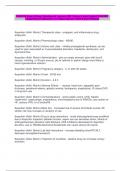NUR3196 Exam 4 Drugs | Questions & Answers (100 %Score) Latest Updated 2024/2025
Comprehensive Questions A+ Graded Answers | With Expert Solutions
Ibuprofen (Advil, Motrin) Therapeutic class - analgesic, anti-inflammatory drug,
antipyretic
Ibuprofen (Advil, Motrin) Pharmacologic class - NSAID
Ibuprofen (Advil, Motrin) Actions and Uses - inhibits prostaglandin synthesis; can be
used for pain associated w/ musculoskeletal disorders, headache, dental pain, and
dysmenorrhea
Ibuprofen (Advil, Motrin) Administration - give on empty stomach (give with food if
nausea, vomiting, or GI pain occurs), pts w/ asthma or aspirin allergy more likely to
have hypersensitive reaction
Ibuprofen (Advil, Motrin) Pregnancy category - C, D after 30 weeks
Ibuprofen (Advil, Motrin) Onset - 30-60 min
Ibuprofen (Advil, Motrin) Duration - 4-6 h
Ibuprofen (Advil, Motrin) Adverse Effects - - nausea, heart burn, epigastric pain,
dizziness, peripheral edema, aplastic anemia, leukopenia, anaphylaxis, GI ulcers/CKD
in long term use
Ibuprofen (Advil, Motrin) Contraindications - active peptic ulcers, CKD, hepatic
impairment, nasal polyps, angioedema, bronchospasms due to NSAIDs; use caution w/
HF, serious HTN, hx of stroke/MI
Ibuprofen (Advil, Motrin) Black box - increased risk of serious thrombotic events, MI,
stroke; risk may increase w/ duration of use
Ibuprofen (Advil, Motrin) Drug to drug interactions - avoid anticoagulants/coag modifiers
due to ibuprofen impaction platelet function, asprin use can decrease action, effects of
antihypertensives (diuretics, beta blockers, ACE inhibitors) decreased w/ ibuprofen,
diuretics, use w/ NSAIDs/alcohol/corticosteroids can cause serious GI events
Ibuprofen (Advil, Motrin) Lab test interactions - increase bleeding time/AST/ALT,
decrease hemoglobin/hematocrit
Ibuprofen (Advil, Motrin) Treatment of overdose - alkaline drug can increase urinary
excretion
,Prednisone Therapeutic class - anti-inflammatory drug
Prednisone Pharmacologic class - corticosteroid
Prednisone Actions and Uses - -A synthetic corticosteroid
-Actions are the result of being metabolized to an active form, which is also available as
drug called prednisolone
-When used for inflammation, duration of therapy is limited 4-10 days
-For long-term therapy, alternate-day dosing is used
-Occasionally used to terminate acute bronchospasm in patients with asthma
-Used as antineoplastic agent for patients with certain cancers (Hodgkin's disease,
acute leukemia, lymphomas)
corticosteroids - - Effective in treating severe inflammation
- naturally released from adrenal cortex
- Suppress histamine and prostaglandins
- Can inhibit immune system to reduce inflammation
Prednisone Administration - - deliver IM injections deep to avoid atrophy or abscesses,
do not use if pt has signs of systemic infection, when used for > 10 days, dose must be
slowly tapered
- Tablet and oral solution forms
Prednisone Pregnancy category - C
Prednisone Onset - 1-2 h
Prednisone Duration - 24-36 h
Prednisone Adverse Effects - long term use may result in crushing's syndrome
(hyperglycemia, fat redistribution, muscle weakness, bruising, bones that easily
fracture) and peptic ulcers
Prednisone Contraindications - use w/ caution for peptic ulcers, ulerative colitis,
diverticulitis; do not use w/ active viral/bacterial/protozoan infection
Prednisone Drug to drug interactions - azole antifungals increases effects, increases
effects of statins, increases hyperglycemia so insulin/oral hypoglycemic drugs may need
to be adjusted, decreases the effectiveness of vaccines
Prednisone Lab test interactions - may inhibit antibody response to toxoids and
vaccines, may increase blood glucose, may decrease serum
calcium/potassium/thyroxine
Acetaminophen has no - anti-inflammatory action and is not an NSAID therefore it is not
effective in treating arthritis or pain caused by tissue swelling following injury
, Acetaminophen (Tylenol) Therapeutic class - antipyretic, analgesic
Acetaminophen (Tylenol) Pharmacologic class - Centrally acting COX inhibitor
Acetaminophen (Tylenol) Actions and Uses - - direct action at level of hypothalamus
and dilation of peripheral blood vessels (enables sweating and dissipation of heat)
- treats fever in children, mild/moderate pain when aspirin is contraindicated, can be
combined with opioids for serious pain
- no effect on platelet aggregation/cardiotoxicity
- does not cause GI bleeding/ulcers
Acetaminophen, ibuprofen, and aspirin have equal efficacy in - relieving pain and
reducing fever
Acetaminophen (Tylenol) Administration - - liquids of different strengths (use correct one
for children)
- do not admin to pt who drinks alcohol regularly due to hepatotoxcity
- found in many OTC medications (do not double dose)
Acetaminophen (Tylenol) Pregnancy category - B
Acetaminophen (Tylenol) Onset - 30-60 min
Acetaminophen (Tylenol) Peak - 0.5-2 h
Acetaminophen (Tylenol) Duration - 4-6 h
Acetaminophen (Tylenol) Adverse Effects - - due to high doses/long term use
- chronic use leads to: neutropenia, pancytopenia, leukopenia, thrombocytopenic
purpura, CKD
- Immediate discontinue if skin reaction/blisters form (stevens-johnsons syndrome)
acute acetaminophen poisoning - anorexia, nausea, vomiting, dizziness, lethargy,
diaphoresis, chills, abdominal pain, diarrhea
number one cause of liver failure in the US - excessive acetaminophen use
Acetaminophen (Tylenol) Contraindications - hypersensitivity to acetaminophen or
phenacetin and chronic alcoholism
Acetaminophen (Tylenol) Black box - - potential to cause severe and fatal liver injury
- may cause serious reactions with symptoms of angioedema, difficulty breathing,
itching, and rash
- due to safety recommendations from FDA, strength in prescription combination tablets
limited to 325 mg to reduce toxicity




